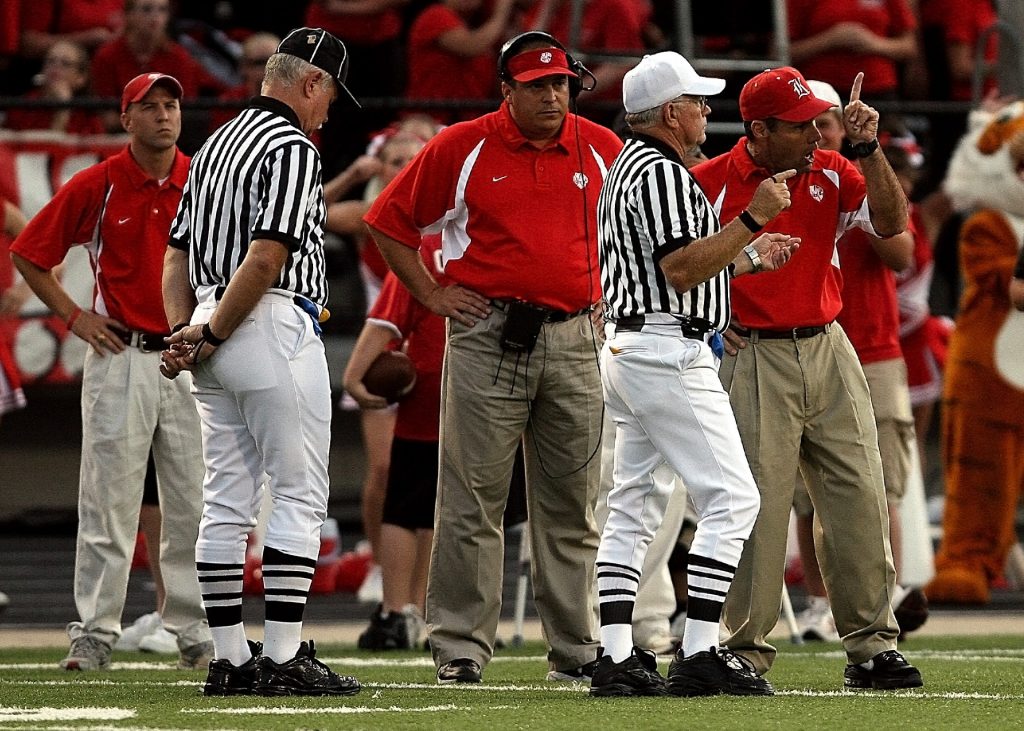
by Paul Casey

Originally published November 19, 2016
A football player moves before the ball is snapped. A facemask gets used to throw a player to the ground. Tempers flare and a fight breaks out. Without a referee enforcing penalties can you imagine the chaos that could ensue during a football game? Keeping professionals in line requires a strong understanding of the rules, the courage to enforce them, and consistency.
In the workplace, employee discipline issues can leave a leader feeling like a referee. That’s when it’s time for you to step up and protect the positive culture you are trying to create. You must have the courage to be like an NFL referee and “throw a penalty flag” or confront below-the-line behavior that could erode what you are working toward.
Often, it’s the small infractions that go unnoticed that can cause the culture to shift in a direction that doesn’t support the values or vision of the organization. For those instances, it helps to have a few coaching tips at the ready so you can keep your team moving toward the goal line.
Let’s explore some situations when you need to throw the penalty flag and discipline employees:
When employees act like wet blankets and smother someone offering up a fragile, creative solution/suggestion, it shuts the team down.
Talk to the person shooting down ideas one-on-one. State the behavior you observed, ask why they continue to shoot down ideas so that you can learn where they are coming from. Explain the ramifications of their behavior and coach them on different ways to express their point of view that would allow space for all ideas.
When there is an unresolved issue between team members and the leader lets it fester, the tension on the team prevents the free flow of team communication.
Recognizing, respecting, and appreciating your team members’ differences is key to building a strong team. When conflicts do arise, meet with the team members individually to state what you observe and ask for their take on the situation. Be sure to explain how the unresolved issue creates tension for everyone else and how it is impacting performance. After speaking individually with all parties, bring them together and work to resolve the issue. Resolving conflict in a quick and proficient manner helps maintain a strong and healthy team environment.
When there is a lack of accountability and people are not completing work on time, the vision slows down, and results stall.
Talk with team leaders about the importance of accountability and the impact not meeting deadlines has on the department, the team, or the final deliverable. Emphasize the vision or objectives that are hoping to be accomplished. If necessary, require daily or weekly progress reports until deadlines are met on a regular basis.
When people don’t show respect for each other’s time, the culture gradually shifts toward starting all meetings late.
Being late costs the company in lost productivity and sets a negative example for coworkers. When an employee is consistently late to meetings, it’s your job as the manager to discuss the issue and find a solution. Meet with repeat offenders one-on-one to find out the reason for their continued tardiness. Make sure they understand how it impacts the group and how it reflects negatively on them.
When those tasked with leading a project or team hesitate and don’t pull the trigger on decisions, precious time is wasted, or opportunities are missed.
Indecision can be frustrating but take the time to understand where their indecisiveness is coming from. Listen to their roadblocks and act as a sounding board to build trust and help move the decision forward. You can also suggest others who might be able to help and present your own information and alternatives.
When there is negativity about team members running amok behind people’s backs, reputations are scarred, relationships crumble, and trust deteriorates.
Communicate to the team that gossip will not be tolerated and remind them of your company values. Be a good role model by not participating in gossip. Encourage your staff to leave or change the subject when the gossip starts. If you need to take a stronger approach meet with culprits individually to let them know, with specific examples, how their behavior is affecting others and disrupting work.
When someone throws caution or restraint to the wind and unloads on a teammate, that relationship may be irreparable for the long haul, and people become guarded around that colleague.
When a team member lashes out, it could be a sign of stress. Pull the person aside, listen actively and responsively while they explain the situation from his/her point of view. Discover areas of stress and empathize with concerns. Share your thoughts and ideas on how to overcome challenges, both in the workplace and with negative behaviors. It may take more than one meeting but try to get agreement from the employee on the decided course of action. Arrange a follow-up date to ensure follow-through and to determine progress.
When leaders allow inappropriate or unprofessional behavior for some people or in certain situations, but not others, that inconsistency causes distrust and stirs up dissension.
To deal with the use of double standards, you can use various techniques, such as asking the person applying the double standards to explain the rationale behind their behavior or asking them how they would feel if someone else applied similar double standards toward them. Be sure to keep a respectful tone.
When small infractions create big issues in the workplace, put on your referee stripes and don’t be afraid to through a penalty flag. Employee discipline helps protect the culture and demonstrates support for your organization’s values and vision. As a leader, you will gain trust and respect as you hold your teammates (and yourself) accountable.
4 minutes a month to ask yourself questions, see others giving back, and be inspired to grow a little bit more everyday. Directly in your inbox.
Get a glimpse at your corporate culture with a free culture audit. Do your mission, vision, and values truly drive your organization?
Download your free 2024 Culture Trend Report now!
